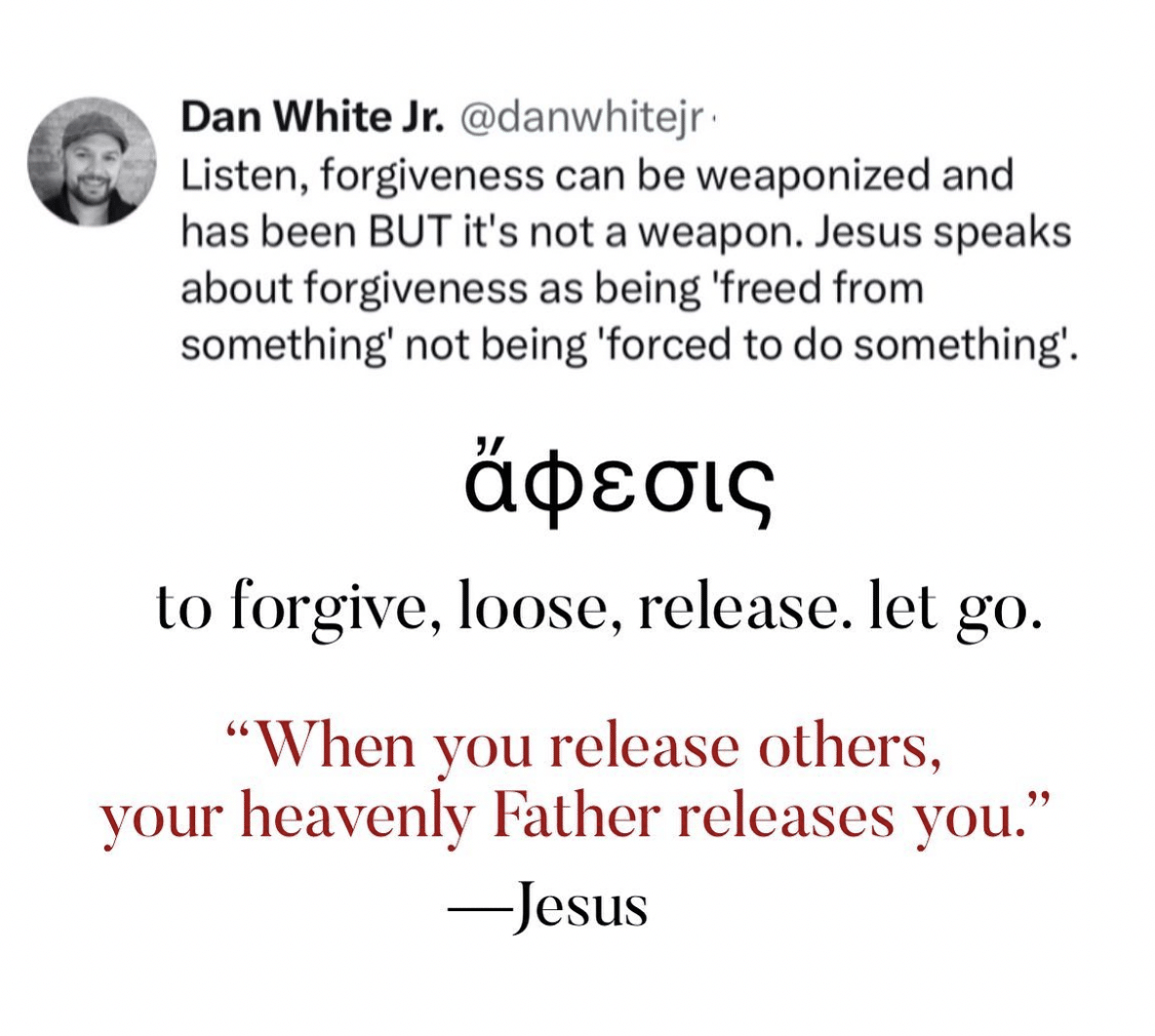Forgiveness is Scandalous Again – Brad Jersak

The Scandal…
Over several years, I have been tracking the results of a rolling survey by a Christian teacher, Dan White Jr. Although we’ve never met, I would call him an online friend.
As Dan visits faith communities across America, he invites Christians to follow Jesus. But wait, isn’t following Jesus the very definition of a Christian? You would hope so, but Dan’s survey explores that question. Throughout his journeys, he presents active claimants of the “Christian” label with passages from Jesus’ own “Sermon on the Mount” (from Matthew 5-7). Then Dan surveys the reaction of Christians to the very words of Jesus Christ, calling us to love, bless and forgive our enemies.
Over time, as the survey results have mounted, Dan sees a disturbing trend. 76% of those who identified as “progressive” saw “loving enemies” as complicity with injustice. And 78% of those who identified as “conservative” saw “loving enemies” as compromise with immorality. As Dan’s poll numbers grew, this was the emerging pattern. He asked his readers, “Do you think we have a problem?”
Dan continued on Twitter,
What was illuminating in our workshops is that most Christians do not see enemy-love as the route to addressing immorality or injustice in the life of another. Somehow they missed how Jesus did it. / For the few folks who believed “loving enemies” was central to being a Christian, many reduced it down to having sentimental nice thoughts.
I responded, “In other words, under 25% of Christians, conservative or progressives, are followers of Jesus. But we sort of knew that.” Dan answered,
The words, works, and ways of Jesus just don’t play well in partisan times. 🙁
Following Jesus is…
Take note that Jesus himself defines his followers (the wise ones who build their house on the rock) as “everyone who hears these words of mine and put them into practice” (Matthew 7:24). I can only conclude what everyone seems well aware of already. Not everyone who claims to be Christian or attends a local church is actually following Jesus (by Jesus’ own definition). Of course, that’s not news. Jesus said so himself in the same message (Matthew 7:21-23):
21 “Not everyone who says to me, ‘Lord, Lord,’ will enter the kingdom of heaven, but only the one who does the will of my Father who is in heaven. 22 Many will say to me on that day, ‘Lord, Lord, did we not prophesy in your name and in your name drive out demons and in your name perform many miracles?’ 23 Then I will tell them plainly, ‘I never knew you. Away from me, you evildoers!’
Now it’s one thing for me to claim to follow Jesus but fail to do so. That’s just the default human condition. We stumble. And we’re forgiven. And we stumble again. And we discover grace. Or grace discovers us. And grace begins to transform us, empowering us to stumble less. In Jesus’ sermon, he’s not condemning those who stumble. He knows we will. Rather, Jesus is inviting us onto his Way, where chronic stumblers like me fall forward into God’s arms of indiscriminate grace.
It’s another thing to pretend we’re perfect and that we never stumble, and when we do, try to hide it. And that’s just your standard hypocrisy. Again, nothing new. And it’s also quite apparent to anyone who is watching. But it’s easiest to spot when the hypocrisy is accompanied by outrage and condemnation at the failings of others. For those who live in hypocrisy, Jesus issues “woes” about how their hypocrisy inevitably catches up to them. There’s a time of reckoning for all of us, but gratefully, we have a merciful Judge whose judgments are restorative. Even the hypocrite can expect a Day of Truth and Reconciliation.
As a hypocrite in recovery, it’s essential that I face the truth about myself before God and empathetic witnesses who can remind me of the good news of Jesus, guide me to make appropriate amends, and pay forward the mercy I have received.
But what Dan is seeing in his survey feels different to me than either the forgiven stumblers or the foolish hypocrites. Here we have an over-3/4 majority of self-confessing Christians who, when shown the very words of Jesus, turn away from his call to love our enemies. In other words, this isn’t just a standard stumble or garden-variety hypocrisy. It is a redefinition of “Christian” that overtly dissociates from Jesus. For 76-78% of active attendees across the religious spectrum, the heart of Jesus’ teaching (revealed most fully at the Cross) no longer defines Christianity for them.
To forgive is to be freed
Dan later identified a central objection to Jesus’ call to enemy love: “Forgiveness has been weaponized.” Now, that’s true. Religious abusers have used forgiveness to silence victims and keep them trapped in violent marriages or toxic communities. It has been weaponized by spiritual abusers to evade accountability and maintain power structures… much like the system Jesus was exposing and overthrowing. But when spiritual abuse weaponizes forgiveness, it is no longer forgiveness at all. It misuses, distorts, and redefines forgiveness into something other than (and even opposite to) forgiveness.
This fact did not dissuade Jesus from preaching forgiveness. Why not? Because, as Dan points out, “Jesus speaks about forgiveness as being freed from something, not being forced to do something.”
And this makes for a good punchline. The New Testament word that we translate as “forgive” (aphiemi) or “forgiveness” (aphesis) does literally mean to loose, let go, or release. And here is where Jesus’ historic sermon makes clear the freedom found in forgiveness. When we forgive… when we loose, let go, or release our enemy from the chains of judgment, resentment, and hatred, we come to recognize the profound experience of being freed ourselves. When we let someone else off the hook, we let ourselves off the hook. We are freed. We are loosed. We are released.
We all know that’s difficult and certainly not a matter of human willpower, justifying sin, or opening ourselves to further abuse. We all know forgiveness can be a painful 70×7 process, and we’re prone to get stuck. But this is precisely where Jesus announces Good News: as we follow Jesus in the path of forgiveness, the grace of our heavenly Father will personally intervene to release you. As you pray, release me as I release those who’ve harmed me, the Father hears our prayer and looses us from our shackles, whether our chains were self-inflicted or imposed by others.
Bottom line: Jesus says to follow him is to forgive is to be freed. (Regardless of what the polls say).











 Plain Truth Ministries | Box 300 | Pasadena, CA 91129-0300
Plain Truth Ministries | Box 300 | Pasadena, CA 91129-0300

